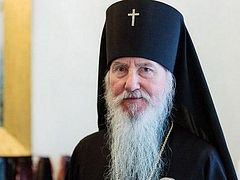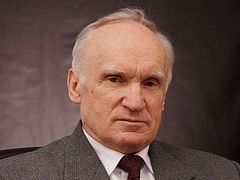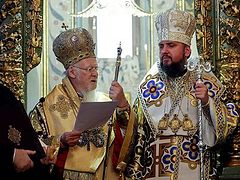Like many pastors in the Orthodox Church, I have been asked recently for my opinion about the events currently happening in Ukraine. I am quite willing to give my opinion when asked, since that is my job as a teacher and a presbyter. But I will not do so here, partly because I have not been asked. Rather I will (as the police say) “back away from the yellow tape”. Rather than talking about the ecclesiastical situation in the Ukraine, of greater interest and possible profit is a discussion about authority in the Church.
Authority is not a bad thing, and is necessary and inevitable in this age, as St. Paul reminds us in Romans 13. The alternative to authority is chaos, just as the alternative to the city is the jungle. Sometimes one is tempted to denounce authority as intrinsically bad, as my generation famously did in the 60’s when we denounced “the Man”. Everyone has experienced bad authority, or authority when it oversteps its bounds and is used in unfortunate ways. In the western church, some people found bishops to be tyrannous and became Presbyterians. Certain other people found presbyteries to be tyrannous and became Congregationalists. Certain other people found Congregationalist boards to be tyrannous and became Quakers or Plymouth Brethren. A whole lot of people in England some time ago found the King of England to be tyrannous, got into a few boats, sailed across the Atlantic, and became Americans. (As a cheeky Canadian I am tempted to inquire whether exchanging a King for a President resulted in a less powerful or intrusive government, but…never mind.) The point is that everyone has experienced situations where authority becomes unhelpful and problematic. The question is how authority can be used in ways that are helpful and not problematic.
I suggest that the early church provides just such a model. It is clear that there was effective authority in the early church. The New Testament itself says, “Obey your leaders and submit to them, for they are keeping watch over your souls as men who will have to give account” (Hebrews 13:17). Those leaders were said to “rule” in their communities (1 Timothy 3:4-5, 5:17), and the faithful were bidden to “respect those who are over you in the Lord and who admonish you” (1 Thessalonians 5:12). These New Testament citations reveal that many did not respect their leaders, which of course is why the exhortations to do so were necessary in the first place.
Exactly how this authority worked out in practice is not apparent from the New Testament, since the New Testament was never intended to function as a detailed blueprint, like a set of Ikea assembly instructions. For those details one needs to look to the succeeding centuries. And there we learn that the authority of the main leader/ presbyter (called the “bishop” early on, as we see from the letters of St. Ignatius of Antioch) exercised that authority in concert with the other presbyters. Authority in the churches thus functioned as a shared leadership, with the bishop operating as the liturgical head of the team of his fellow-presbyters with whom he shared the actual rule. The bishop was the main leader and usually got his way by the exercise of his moral authority, but the day-to-day decisions were made by his local council of presbyters.
We see this interplay of joint authority at work in the life of St. Cyprian of Carthage. Cyprian had no doubt that he was the leader of the local church, to the point where he vigorously denounced the martyric confessors who, without reference to Cyprian’s episcopal authority, unilaterally undertook to restore to communion those who had lapsed. But Cyprian still functioned as part of a presbyteral team, and when he appointed a subdeacon and a reader during a time of emergency without the express consent of his presbyters, he wrote to apologize to them and to justify himself, saying, “Nothing new has been done by me in your absence”, because normally the express consent of the presbyters was required for such ordinations/ appointments.
In those days, authority in the church was both local and shared. It was local in that every city, town, village, and hamlet had its own bishop who presided over and coordinated sacramental church life in those locales. It was shared in that every bishop functioned in concert with his board of presbyters who ruled along with him as a single united council. The bishop was therefore primarily responsible to his fellow-presbyters, and he exercised his authority in the midst of the people whom he saw every week at the Liturgy.
In other words, this shared authority was exercised within a series of relationships, which alone made exercising them in love possible. Relationship is always local in nature. We have a great many relationships, but the more distant they are, the less real they are—i.e. the less like a real relationship. For example, I have relationship with my wife whom I see every day; I have a relationship with my deacon whom I see every week; I have a relationship with my Parish Council which I see as a Council every month, and I have a relationship with my bishop whom I see every year. (One cannot blame the bishop for his rare presence at my parish; his diocese includes the entirety of Canada, and not being able to bi-locate he cannot be in two places at the same time. We therefore see him infrequently, given the immense demands upon his time.) My relationship with my Prime Minister is even more distant, for I never see him (a fact which I cannot really lament), and my relationship with my Sovereign is more distant still. I often pray for her Majesty the Queen, but my chances of meeting her are even less likely than the chances of meeting my Prime Minister.
One could say, therefore, that as relationships extend over distance they become less real and also less effective. Moreover, we may conclude that if long-distance relationships do become real and effective (such as the long-distance relationship with a government ruler or official) it is more likely to be problematic in nature. If you doubt this, think of the history of the word “bureaucratic”, and ask yourself why calling someone a bureaucrat is so rarely a compliment. Often the adjective “heartless” is attached to the noun, for we often experience bureaucracy as inefficient at best and harmful at worst. It is hardly, I might add, the fault of the usually well-intentioned bureaucrat. The problem is rooted in the distance between the bureaucrat making the decisions and the ones whom the decisions affect. The bureaucrat is almost never in a position to have enough facts to make a good decision or to know what he or she is talking about, with the result that the decision the bureaucrat makes is often unfortunate.
This goes for churches as well as secular governments. In the days of the early church, the bishop always knew what was going on in his diocese because he lived there among the people and knew them very well, since he saw them every week at the Eucharist. He was the one who baptized them when they became Christians, who anointed them when they were sick, who excommunicated them when they were bad, and who reconciled them to the church when they were penitent. In other words, he was their pastor. Of course he knew what was going on, and his decisions were likely to be wise (or at least explicable) because his authority was local. His authority was also shared with his fellow-presbyters, so that he could have the advantage of their input. Two (or more) clerical heads proved to be better than one.
The problems arose later in the days of the Constantinian era, when bishops expanded their geographical reach and ceased to be effectively part of a local team. Increasingly the bishops saw themselves as accountable not to their local church, but to the other bishops. They no longer functioned as the head of a local church family and presbyterium, but more as a kind of CEO or as a member of the episcopate at large, unencumbered by the nuisance of local accountability. (The change, which took place gradually and unevenly, is described in my book The Empty Throne.)
This could become problematic, since increasingly there was no one who could correct a bishop when his distance from the local church under his care resulted in unfortunate decisions. If a bishop was married, and if he functioned as part of a local presbyterium, it was easy enough to correct him. If his wife didn’t tell him he was making a bad mistake, his fellow-presbyters could. At very least those adversely affected by unfortunate decisions could let him know after the Sunday Liturgy. But a celibate episcopate, living at a distance, separated from the bulk of the laity, and owing no accountability to the presbyters (whom he could dismiss at will) had a lonelier existence and was the less locally accountable.
This of course did not mean that in the past bishops were all overbearing or tyrannous, and it does not mean so today. Speaking personally, I have been very fortunate in my clerical experience of bishops (including my present bishop, who is quite wonderful), and I know of very many bishops who are humble, holy, and hardworking. My point is that they are humble and holy despite the system of authority they have inherited, and not because of it. As one bishop humorously remarked regarding occasional episcopal lapses of some other bishops, “You dress us up like emperors and tell us to live forever—what do you expect?” Point taken, bishop. It is too easy for the bishops at a distance from the people for whom they must make decisions to make poor decisions. They cannot know the local situation about which they decide, and there is no one handy to offer advice in the cases of ignorance or correction in the cases of pride.
It is hardly surprising therefore if occasionally some bishops make decisions which are problematic with the result that the yellow tape goes up afterward. Doubtless most bishops are doing the best that they can. The answer would seem to lie in a return to authority that is both local and shared. That is, we want more bishops, not less, so that the bishops can have greater knowledge of the locales about which they are called upon to make decisions. And we want more input offered in the final decisions to be made so that the bishops are not left to make decisions in a vacuum alone.
It is a scary thing to be a leader in the Church, which is doubtless why St. James counselled most people to avoid it (James 3:1). All the more reason to pray for those who bravely choose such a dangerous job, and perhaps to offer them counsel as well as love. For when bad decisions are made and the yellow tape goes up, there are consequences in the age to come as well as in this present life. All the more reason to love our leaders and to pray for them.




